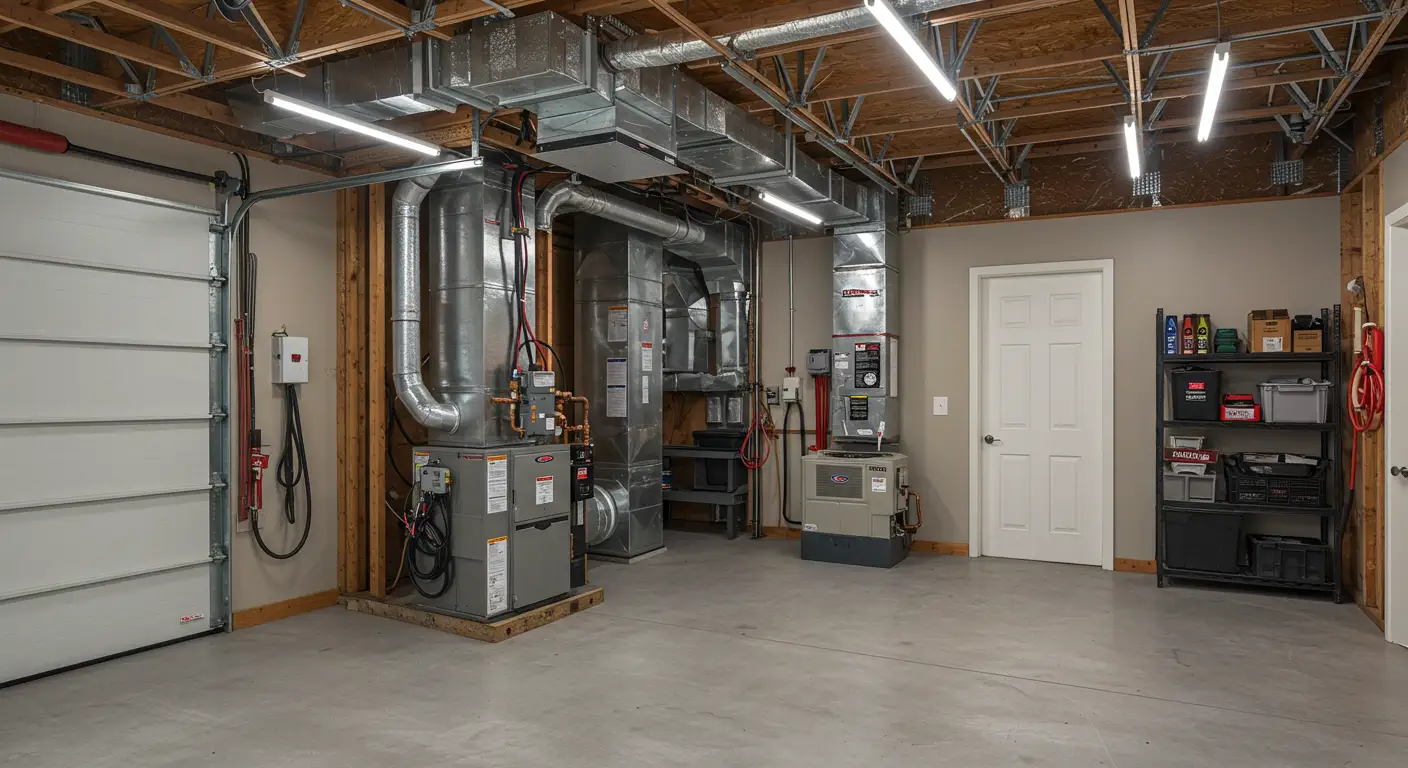Garage Heating & Air Conditioning in Auburn, GA
Garage heating & air conditioning in Auburn, GA with Res Air LLC. Enjoy comfort year-round. Call today for expert HVAC service and installation you trust!
Garage Heating & Air Conditioning In Auburn, GA
A properly conditioned garage transforms an underused space into a comfortable workshop, storage area, or year-round bonus room. In Auburn, GA, where hot, humid summers and mild winters create unique comfort and moisture challenges, garage-specific HVAC solutions from Res Air LLC ensure reliable temperature control, humidity management, and safety. This page outlines the best system options, why accurate sizing matters for unconditioned spaces, insulation and ventilation recommendations, the typical installation process, zoning and control options, safety considerations for garage installs, and the outcomes you can expect.
Why Garage HVAC Is Different In Auburn, GA
Garages are often treated as unconditioned spaces with high air leakage, minimal insulation, and large garage doors that drive heat gain and loss. In Auburn, summer heat and humidity can quickly make a garage unusable without proper cooling and dehumidification. Winter nights are usually mild but can still cause condensation and cold-sensitive items to degrade. That combination makes dehumidification, proper sizing, and air sealing especially important. With Res Air LLC, homeowners in Auburn receive professional guidance tailored to these unique challenges.

Common Garage HVAC Options
- Ductless Mini-Splits: Ideal when ductwork is absent. Mini-splits provide efficient cooling and heating, fast installation, and precise zoning. Their built-in dehumidification is a major advantage in humid climates like Auburn.
- Heat Pumps: Modern heat pumps provide efficient heat and cooling in climates with mild winters. A heat pump system—either ducted or ductless—offers year-round efficiency and good humidity control.
- Packaged Units: Compact all-in-one rooftop or on-slab packaged systems can serve a garage when space and ducting routes are limited. They are suitable for larger garages or attached workshops.
- Forced-Air Systems Tied To The Home: Extending the home’s HVAC to the garage is possible but only when ducts and capacity are appropriate. This option requires careful load calculations and often improved sealing and insulation to avoid inefficiency.
Why Load Calculations Matter For Unconditioned Spaces
An accurate, industry-standard load calculation for a garage accounts for:
- Large door area and frequent opening
- Lower insulation and thermal bridging through framing and concrete slab
- Solar gain on garage doors and walls
- Internal heat sources like vehicles or equipment
Without a proper load calculation you will risk undersizing (poor comfort and excessive runtime) or oversizing (short cycling, humidity issues, and premature wear). In Auburn’s humid summers, undersized cooling leads to high humidity that promotes condensation and mold. Res Air LLC ensures every installation begins with a precise load calculation.
Insulation And Ventilation Recommendations
- Insulate Walls And Ceiling: Add cavity insulation and consider insulating the common wall between garage and house to reduce heat transfer.
- Insulate Or Replace The Garage Door: An insulated garage door with good seals reduces solar heat gain and air infiltration.
- Air Sealing And Weatherstripping: Seal gaps around the door, windows, service entries, and where utilities penetrate the envelope.
- Ventilation And Exhaust: Provide controlled ventilation when chemicals, paints, or vehicle exhaust are present. Mechanical exhaust or a dedicated garage ventilation fan helps expel fumes. In general, avoid continuous fresh air exchanges during extreme humidity unless a dehumidification strategy is in place.
- Moisture Control: Use a vapor retarder on cold exterior walls if condensation is a concern, and ensure proper slab sealing to limit ground moisture.
Typical Installation Steps
- Site Assessment: Inspect garage layout, door orientation, insulation level, electrical capacity, and planned usage (workshop, storage, gym).
- Load Calculation And System Selection: Size equipment based on heat gain/loss, internal loads, and occupancy patterns. Choose mini-split, heat pump, packaged unit, or duct extension accordingly.
- Electrical And Structural Prep: Confirm circuit capacity, install disconnects, and prepare mounting points for outdoor units or packaged systems.
- Mechanical Installation: Mount indoor heads or ductwork, run refrigerant lines or ducts, install condensate routing and pumps where needed.
- Controls And Zoning Wiring: Install thermostats or zone controllers and integrate with existing HVAC if required.
- Commissioning And Testing: Verify refrigerant charge, airflow, temperature differentials, condensate drainage, and dehumidification performance.
- Homeowner Orientation And Maintenance Plan: Explain basic operation, filter access, and seasonal checks.
Every project by Res Air LLC follows these structured steps to guarantee efficiency and long-term performance.
Zoning And Control Options
- Dedicated Thermostat: A separate control for the garage keeps settings independent of living spaces.
- Multi-Zone Mini-Split: Multiple indoor heads allow distinct temperature control for different areas within larger garages or attached workspaces.
- Smart Controls And Scheduling: Wi-Fi thermostats and occupancy-based schedules reduce runtime and maintain comfort only when the space is used.
- Humidity-Based Control: Systems with humidistats or combined dehumidification cycles are especially useful in Auburn to prevent sticky, damp conditions.
Safety And Code Considerations
- Carbon Monoxide And Combustion Safety: If vehicles or gas-powered equipment operate in the garage, ensure proper ventilation and avoid locating combustion appliances that could backdraft. Install and maintain CO alarms in adjacent living spaces according to local guidelines.
- Combustible Storage: Maintain clearance between HVAC equipment and stored combustibles. Avoid storing flammable materials near heat sources or exhaust.
- Electrical And Disconnect Requirements: Garages may require dedicated circuits and a lockable disconnect for outdoor units. Confirm that the electrical supply supports chosen equipment.
- Condensate Management: Proper condensate drainage prevents standing water and mold. A condensate pump may be necessary if gravity drainage is not possible.
- Refrigerant And Leak Checks: Regular inspections for refrigerant integrity prevent system inefficiency and environmental harm.
Expected Outcomes And Benefits
With a correctly designed garage HVAC solution in Auburn, GA you can expect:
- Year-Round Comfort suitable for hobbies, workshops, home gyms, or finished storage
- Improved Humidity Control that protects tools, electronics, and stored items from corrosion and mold
- Reduced Thermal Transfer into adjacent living spaces when the garage is properly sealed and insulated
- Energy-Efficient Operation when systems are sized correctly and paired with insulation and air sealing
- Extended Usability of the garage during hot, humid summers and cooler nights
Res Air LLC delivers these results by combining technical expertise with local climate knowledge.
Maintenance Tips For Long-Term Performance
- Replace Or Clean Filters regularly and inspect condensate lines for blockages
- Schedule Annual Tune-Ups for refrigerant charge, electrical connections, and airflow checks
- Recheck Weatherstripping on garage doors and service doors seasonally
- Monitor Humidity and set controls to maintain comfortable, non-sticky conditions
- Address Issues Promptly: Any unusual odors, noises, or performance drops should be resolved quickly to avoid bigger repairs
A carefully planned garage HVAC system—paired with insulation upgrades, sensible ventilation, and correct sizing—turns an underused bay into dependable, year-round living and working space in Auburn, GA. Proper design minimizes energy waste, protects stored items, and keeps the indoor environment healthy and comfortable despite local heat and humidity. With Res Air LLC, homeowners gain peace of mind and dependable results.
Transform Your Garage Comfort With Res Air LLC
Don’t let your garage go unused because of Auburn’s hot summers or damp, chilly nights—turn it into a space you can enjoy year-round. With Res Air LLC, you get expert garage heating and cooling solutions designed for efficiency, comfort, and durability. Whether you’re looking to create a workshop, gym, or secure storage space, our team ensures your garage stays protected from humidity, heat, and cold. From load calculations to professional installation and ongoing maintenance, we handle every detail. Ready to upgrade your garage comfort? Contact Res Air LLC today to request a free estimate and get started!


Financing
We make comfort affordable with flexible financing options through Optimus and Synchrony, giving you stress-free payment solutions for your HVAC needs.


Customer Testimonials
At Res Air, our customers’ satisfaction speaks louder than words. From fast emergency repairs to flawless system installations, homeowners trust us for reliable comfort and professional service.


.png)
.jpg)
